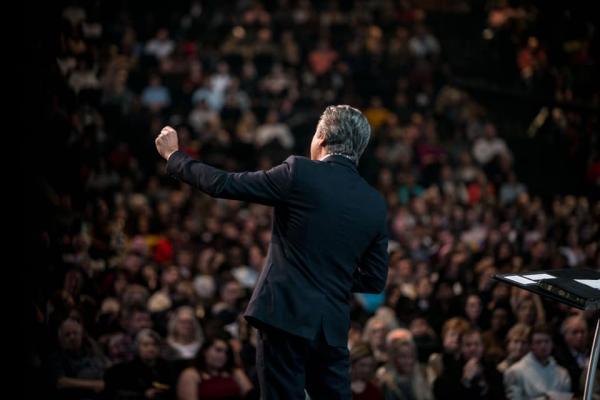There’s a new candidate running for California’s Third Congressional District. His name is Sean Feucht. Feucht’s Twitter feed reads like a Fox News teleprompter. After the January assassination of Iranian General Qassem Soleimani, he invoked Matthew 5:9 on twitter saying: “PEACEMAKING also looks like taking out the worlds #1 terrorist…”
But Feucht is no politician; he’s a celebrity worship leader from Bethel Church in Redding, Calif. He’s young and hip, but his socially progressive persona strikes a dissonant chord with his nationalistic politics and theology.
Feucht is the latest movement in Bethel’s willingness to attach their signs-and-wonders spirituality to a political agenda. Shortly before the 2016 election, Senior Pastor Bill Johnson came out in bold support saying that he opened up his Bible and discovered that there was no way he could vote for Hillary Clinton, and would instead put his support behind Donald Trump.
American megachurch pastors like Johnson are becoming increasingly emboldened in equating the kingdom of God with the administration of President Trump. What began as discomfort during the 2016 Republican primaries mutated into absolution after white evangelical supporters failed to bat an eye at the Access Hollywood Tapes around the time of the Republican National Convention last election. And finally, absolution gave way to wholesale anointing when more than 30 evangelical leaders visited the White House for a worship service and photo opportunity with Trump.
Among those present were Bill Johnson’s son Brian, Sean Feucht, and Hillsong Founder Brian Houston. The marriage of U.S. nationalism and white evangelicalism was complete. This was not just a photo op, it was a coronation and a dog whistle to evangelicals in the lead-up to the 2020 election.
It is this unholy marriage — set against the backdrop of impeachment proceedings, the assassination of a foreign leader in a foreign territory, and more children now in captivity on the Mexican border than in any time in U.S. history — which should make any follower of Jesus ask, How can we conflate this kind of leadership with the kingdom of God?
I observe this from the safe distance of Aotearoa, New Zealand. Some may be familiar with our Prime Minister Jacinda Ardern and the immediate action she took following the Christchurch massacre earlier last year that left 51 worshippers at two mosques dead. In the months that followed, a gun buy-back program removed over 56,000 assault and military-style firearms from public circulation. It’s inspiring, and yet there are still disturbing undercurrents of unrest in our nation.
Aotearoa, New Zealand has the fifth highest rate of incarceration in the OECD, not far behind the United States. Māori, Aotearoa, New Zealand’s Indigenous people, make up 50 percent of prison inmates despite being only about 15 percent of our population. And echoes of Standing Rock and Mauna Kea can be seen at Ihumātao, where Māori protectors — prophets in their own right — have occupied the Otuataua Stonefields over the past year in the face of an enormous and threatening law enforcement presence.
This is a delicate moment for our small Pacific nation. We are in desperate need of voices of compassion and the nonviolent way of Jesus. And yet Christian conferences in Aotearoa, New Zealand which draw thousands often feature communicators who were at the White House praying for Trump in October.
A regular visitor to our shores is Jentezen Franklin, the Senior Pastor of Free Chapel in Atlanta, Ga. Franklin speaks to thousands here with his Joel-Osteen-brand of prosperity gospel. He wrote a response to Mark Galli’s Dec. 19 Editorial for Christianity Today titled "Why I Still Stand By Donald Trump." He argues that Trump exhibits “a different kind of moral fiber.” This is “… a president who has lived up to a different kind of integrity and character in a leader by keeping his promises.”
He is referring to pro-life promises and religious liberty promises, but we know that Trump made other promises too.
There was the promise to end Deferred Action for Childhood Arrivals (DACA) and deport the American children of immigrants, sending many back to places where their lives are in immediate and severe danger. The promise to impose a “Muslim Ban,” refusing entry to the United States because of a person’s race and religion. And of course, the promise to build a wall to keep out apparent Mexican “rapists,” criminals, and drug dealers. Had the Christmas story played out in Trump’s America, a Middle Eastern childlike Jesus would have nowhere to lay his head.
After the October photo op with evangelical leaders, Brian Houston said, “With America strong, the world is a better place.”
And yet the voices of countless countries and minorities would say the strong arm of the U.S. has often been the arm of oppression. Has the privileged position of white evangelicals left them unable to discern the difference between Rome and God’s kingdom? The voice of the prophet is often blunted by too much time spent in Caesar’s court.
“It's been true throughout our history as the church that those prophets who began in the wilderness sometimes lose their prophetic edge when they spend too long in the King's court,” said Justin Duckworth, Bishop of the Anglican Diocese of Wellington in Aotearoa, New Zealand. “There is a troubling lack of those today who are able to tell discern between the Kingdom and the Empire.”
Those who gathered at the White House are no doubt gifted Christians with much to offer, but I fear their voices have been co-opted by too many dinners and photo opportunities in the company of those who believe that peacemaking looks like marginalization and militancy.
So from Aotearoa, New Zealand I’d like to ask something of my American brothers and sisters. You are expert at exporting your culture even to the ends of the earth. I know many more pastors and preachers will come to our little islands in the next year. But please, send us your prophets.
Send us those who will renew our commitment to the poor rather than to a political ideology. Send us the ones who live in urban neighborhoods rather than gated communities. Send us those who will enlarge our hearts for the other rather than making us fear the stranger. Send us those who measure the success of their ministries with names rather than numbers. Send us those who don’t want to sell their latest album, but want us to produce something indigenous and contextually appropriate to our land. Send us those who will stand at Mauna Kea, Standing Rock, and Ihumātao. Send us those who will weep and pray with those who lost loved ones during the Christchurch attacks. Please, send us your prophets.
Got something to say about what you're reading? We value your feedback!





